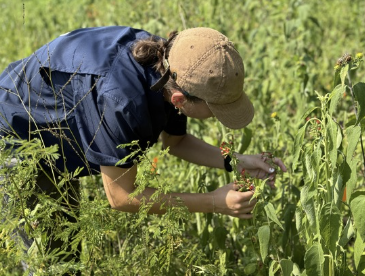|
Experience Gained
Students working with SEPAL will gain a wide range of practical, technical, and professional
skills through project-based learning:
- Research and Analytical Skills: Students will gain hands-on experience in designing and conducting controlled environment
experiments, ecological monitoring, and collecting and analyzing physiological data
including gas exchange rates and water use efficiency. Emphasis will be placed on
data management, statistical analysis, and data visualization using R to interpret
trends and inform conservation strategies
- Creative and Communication Skills: Students will develop a range of competencies in visual communication and public
engagement, including the design of interpretive signage, educational materials, and
digital media that effectively convey scientific concepts to audiences with varying
scientific literacy. They will explore principles of science storytelling to craft
compelling narratives and visuals about native plants and conservation efforts. Additionally,
students will learn how to design and administer surveys, conduct structured interviews,
and analyze qualitative and quantitative feedback to assess public perception and
the effectiveness of outreach strategies. These skills will be applied in real-world
settings such as pollinator gardens, campus installations, and community events, allowing
students to evaluate and refine their work based on audience engagement and response.
- Technical Writing and Presentation: All students will practice presenting their work through posters, reports, and public
talks, improving their scientific and professional communication.
- Community Engagement: Students will work directly with external stakeholders to translate research into
applied practices, such as providing best practices for propagation and transplantation
of native plants, signage for demonstration gardens, and materials for outreach.
Through these experiences, students will gain competencies that prepare them for graduate
school, research positions, nonprofit work, or careers in sustainability, horticulture,
and public education.
|
|
Majors and Interests Needed
- Art
- Biochemistry
- Biology
- Electrical Engineering
- Environmental Engineering
- Environmental Science
- Integrated Health Science
- Interactive Design
- Learning, Design, and Technology
- Media and Entertainment
- Organizational and Professional Communication
- Secondary Education (Mathematics, Broad Field with Biology Emphasis)
|
|






